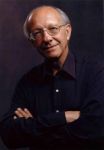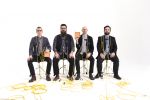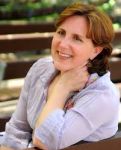| + | Program Notes |
Creating A Narrow Sea
An Interview with Caroline Shaw
How did this commission come about? Sō Percussion brought up the idea of writing a piece for them with Dawn Upshaw and Gil Kalish, possibly to be paired with George Crumb's American Songbook. Of course I'm a huge fan of all of these artists, and I've known the guys in Sō for several years, so this was a kind of dream piece. I've also worked with lyrics from old American hymns and folk songs, like Crumb has, and I was excited to try making a new chapter of that project.
Have you worked before with Sō Percussion? How about Dawn Upshaw or Gil Kalish? Sō before, yes. I wrote a piece called Taxidermy for them when I was at Princeton, as well as a funny little duet I wrote to perform with Eric. (Eric hums fabulously.)
Soprano, piano, percussion isn't necessarily a "standard" grouping of musicians. Did this impact your conception of the piece? It isn't!! And the world of percussion is vast, so it really allows a composer to create a very unique, specific kind of world. My previous work with folk song involved a string quartet, but this is an entirely different universe—ceramic bowls, flower pots, humming, a piano played like a dulcimer by five people at once...The presence of the piano has been really interesting too. It serves sometimes as a grounding force, or a familiar memory, that keeps reappearing amid the different textures that Sō Percussion introduces. And of course Dawn Upshaw is her own brilliant instrument, and I tried to create vocal lines that allow for her warmth and directness.
What texts are featured in your piece? Do you have any special connection to them? They are all lyrics from songs found in the Sacred Harp, a collection of shape note hymns first published in the 19th century. Some of these lyrics exist in several variations as they found their way into different tunes, and I'm adding a tiny notch to their history by setting them to entirely new melodies, and in very different ensemble textures. All of the lyrics I worked with share two features: each refers to water in some way (the river Jordan, swelling flood, narrow sea—images of what lies between this world and the next), and each has a sense of joy in looking to heaven. Of course, a part of joy is great sadness, and, for me, music is a way to begin to understand that mystery and sensation.
What does this piece mean to you? It is about the human yearning for home. So many of these hymns sing about "going home" or crossing over, and the image of a river, a narrow sea dividing this world from the next, is a potent one. These words may be hundreds of years old, but the essential yearning for a home, a safe resting place, is searingly relevant today, throughout the world.
| + | Reviews |
DAWN UPSHAW SINGS EXPERTLY WITH PIANO AND PERCUSSION
By Joshua Kosman, SF Chronicle
Musical works scored for voice, piano and percussion quartet aren't exactly a plentiful commodity in the repertoire. So what are the odds of two such works showing up on a single concert program?
Not as long as you might expect, to judge from Thursday night's freewheeling, emotionally urgent event in Herbst Theatre. Soprano Dawn Upshaw, pianist Gilbert Kalish and the enterprising quartet So Percussion teamed up under the auspices of San Francisco Performances to do a pair of song cycles that worked along similar lines — not only as far as instrumentation was concerned, but in terms of material and emotional resonance as well.
That wasn't really a coincidence, of course. "The Winds of Destiny," the fourth installment in George Crumb's ongoing multipart project called "American Songbook," set the terms for the meeting, and it was easy to tell — even without reading the program notes — that Caroline Shaw's "Narrow Sea," which had its second performance and West Coast premiere, was written as a companion piece for it.
Both composers take their texts from the American folk tradition. Crumb's 45-minute cycle harks back to the Civil War, with settings of "When Johnny Comes Marching Home," "Go Tell It on the Mountain," "Shenandoah" and others. Shaw draws on the shape-note hymns from the collection "The Sacred Harp," of which "Wayfaring Stranger" is probably the best known.
Yet for all the surface similarities between the two works, each composer mines a distinctively personal expressive landscape, and the performances — stark, assured, often directly communicative — made those differences clear.
Crumb's cycle, which occupied the second half of the program, is a confrontational, highly charged work, in which the bleeding wounds of war lurk just below the surface. A staged version by director Peter Sellars, which Upshaw performed in 2011 as part of the Ojai Festival, pulled these themes into plain view, with undramatic effect.
But in concert, Crumb's creative strategy proved more cunning and persuasive. He tends to stick closely to the original melodies, but grafts onto them instrumental accompaniments that are by turns atomized, allusive or texturally surprising. "When Johnny Comes Marching Home" is practically a musical ghost story (and there's a snippet of Mahler's First Symphony to tie it in with other traditions); "Go Tell It on the Mountain" gets a vibrant, chiming overlay.
Shaw's writing, by contrast, is tenderly sympathetic almost to a fault. The texts she chooses are those of homecoming and nostalgia, and she fits them with melodies that have the straightforward sentiment of a finely tuned lullaby. Even the percussion effects — strumming the strings of the piano, pouring water audibly from one bowl into another — register as a sonic caress.
Upshaw's singing was nimbly tailored to these different worlds, bringing fluidity and grace to Shaw's music and an explosive vitality to Crumb's. Kalish and the members of So Percussion — Eric Cha-Beach, Josh Quillen, Adam Sliwinski and Jason Treuting — matched her step for step, in performances of expertly shaped commitment.
As an appetizer, the quartet took the stage for "Music for Wood and Strings," a blooming, expansive piece of minimalist counterpoint by Bryce Dessner in a Steve Reich vein. The music stopped abruptly after 12 minutes, just as some of its most interesting ideas were starting to take shape, so it was a relief to learn that this was an excerpt from a larger piece.
Joshua Kosman is The San Francisco Chronicle's music critic. Email: jkosman@sfchronicle.com Twitter: @JoshuaKosman
Composer: Caroline Shaw
Instrumentation: voice, piano, percussion ensemble
Premiering Artists: Dawn Upshaw, soprano
Gilbert Kalish, piano
Sō Percussion
Duration:
Publisher Contact
Artist Contact
for Dawn Upshaw
http://www.colbertartists.com/
for So Percussion
https://sopercussion.com/

Caroline Shaw
(Click for full size image)

Gilbert Kalish
(Click for full size image)

So Percussion
(Click for full size image)

Dawn Upshaw
(Click for full size image)
